|
|
|
Sort Order |
|
|
|
Items / Page
|
|
|
|
|
|
|
| Srl | Item |
| 1 |
ID:
104038
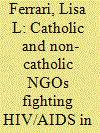

|
|
|
|
|
| Publication |
2011.
|
| Summary/Abstract |
While governments in sub-Saharan Africa work to provide in-country relief for the HIV/AIDS crisis, much health care and infrastructure comes from local or international non-governmental organizations (NGOs). The literature on NGOs suggests that collaboration increases their efficacy. Many non-Catholic NGOs do not work collaboratively with Catholic NGOs on HIV/AIDS, though the Catholic Church has rich and varied resources at its disposal for relief work. Observers often characterize the incompatibility of Catholic and non-Catholic NGOs as tactical, especially with regard to condom use. However, divergent issue framing is a critical and more fundamental distinction between the two groups. Contrasting the Catholic Church's unique spiritual frame with the scientific frame of many non-Catholic NGOs highlights the epistemological and teleological differences between the two. Reconciling these differing approaches, or finding ways to cooperate despite them, is a key element of promoting broader NGO collaboration on HIV/AIDS relief work. This theoretical analysis suggests directions for future empirical research.
|
|
|
|
|
|
|
|
|
|
|
|
|
|
|
|
| 2 |
ID:
104036
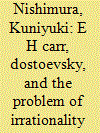

|
|
|
|
|
| Publication |
2011.
|
| Summary/Abstract |
Despite a number of recent studies of Carr's classical theory of international relations, scholars still virtually ignore his early biographical works, especially the one on Dostoevsky. By recovering the connection between Carr's view on international politics and that on Dostoevsky, the present article attempts to advance our understanding about the meaning of Carr's realism-utopianism dichotomy. What Carr tried to do in The Twenty Years' Crisis was to transcend the nihilistic relativism that appeared as a corollary of the rise of the problem of human irrationality. Carr learned from Dostoevsky the epochal meaning of this problem as well as vital insights for generating his own solution to it. Thus arguing, the present article aims at renewing our awareness of the significance of context in the inquiries into early International Relations as well as adding another contribution to the recent revisions of classical realism.
|
|
|
|
|
|
|
|
|
|
|
|
|
|
|
|
| 3 |
ID:
104039
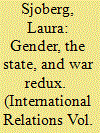

|
|
|
|
|
| Publication |
2011.
|
| Summary/Abstract |
In her recent article, 'Women, the State, and War,' in a special issue of this journal honoring Kenneth Waltz, Jean Elshtain explores the question of what if anything it does to 'put gender in' to analysis of Waltz's three 'images' of International Relations, and determines that gender is not definitive or causal in war theorizing. This article suggests that, while the question is an important and appropriate one to ask, the evidence that Elshtain brings to bear and the tools she uses to answer the question are inadequate to the task and not reflective of the current 'state of the field' of feminist International Relations. Addressing the question of if gender 'alters in significant ways' 'man, the state, and war,' this article provides theoretical and empirical examples from the young but rich field of feminist International Relations to present readers with the substance of feminist claims and the warrants behind feminist arguments. It urges International Relations to decide on the question of the relevance of gender by taking work in the area seriously, and suggests that the discipline might be convinced that acknowledging gender is crucial if scholars engage with the literature that sees 'man, the state, and war' as gendered.
|
|
|
|
|
|
|
|
|
|
|
|
|
|
|
|
| 4 |
ID:
104034
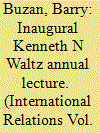

|
|
|
|
|
| Publication |
2011.
|
| Summary/Abstract |
The category of superpower, as distinct from great power, has become naturalized in the discourses about international relations. But 'superpower' has only become common usage since the end of the Second World War and in modern history cannot meaningfully be applied much further than the 19th century. This article argues that superpowers are a historically contingent phenomenon whose emergence rested on the huge inequality of power between the West and the rest of the world that developed during the 19th century. As this inequality diminishes, the most likely scenario for world politics is decentred globalism, in which there will be no superpowers, only great powers. The largest section of the article uses a framework of material and social factors to show why the US is unlikely to remain a superpower, and why China and the EU are unlikely to become superpowers. The following three sections use the same framework to look more briefly at why a world with only great powers is likely to take a more regionalized form; why this might produce a quite workable, decentralized, coexistence international society with some elements of cooperation; and what the possible downsides of a more regionalized international order might be, focusing particularly on the problem of regional hegemony. The conclusions offer five policy prescriptions for living in a decentred globalist world.
|
|
|
|
|
|
|
|
|
|
|
|
|
|
|
|
| 5 |
ID:
104035
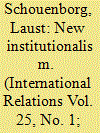

|
|
|
|
|
| Publication |
2011.
|
| Summary/Abstract |
In this article I engage with the theoretical opening provided by Barry Buzan's From International to World Society? I present an argument for five functional categories, which should be able to encompass all the institutions identified by English School scholars throughout history. Their introduction should point the way towards a sounder analytical framework for the study of what Buzan believes should be the new subject of the discipline of International Relations (IR). This subject is defined as second-order societies, meaning societies 'where the members are not individual human beings, but durable collectivities of humans possessed of identities and actor qualities that are more than the sum of their parts', and where the content of these societies, and the key object of analysis, is primary institutions. The purpose of the five functional categories is to break down this 'social whole' and provide a set of lenses through which to potentially analyse international societies throughout history.
|
|
|
|
|
|
|
|
|
|
|
|
|
|
|
|
| 6 |
ID:
104037
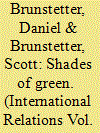

|
|
|
|
|
| Publication |
2011.
|
| Summary/Abstract |
The German Green Party's evolution from an absolute pacifist party to what we call engaged pacifism during the period from 1992 to 2005 deserves the attention of just war scholars because such an evolution shows how and why pacifists can come to accept - and limit - the use of force. Because the German Greens' values are embedded in pacifist principles linked to Germany's strategic culture - a presumption against war, fear of state power politics and escalation, and a deep sensitivity to war's destructiveness - their foreign policy outlook is defined by an alternative logic encompassing different strategies and goals compared to the just war tradition. The Kosovo crisis and the War on Terror demonstrate how the Greens' engaged pacifism offers a form of critical solidarity with the just war tradition by serving as a check on certain interpretations of the jus ad bellum criteria.
|
|
|
|
|
|
|
|
|
|
|
|
|
|
|
|
|
|
|
|
|